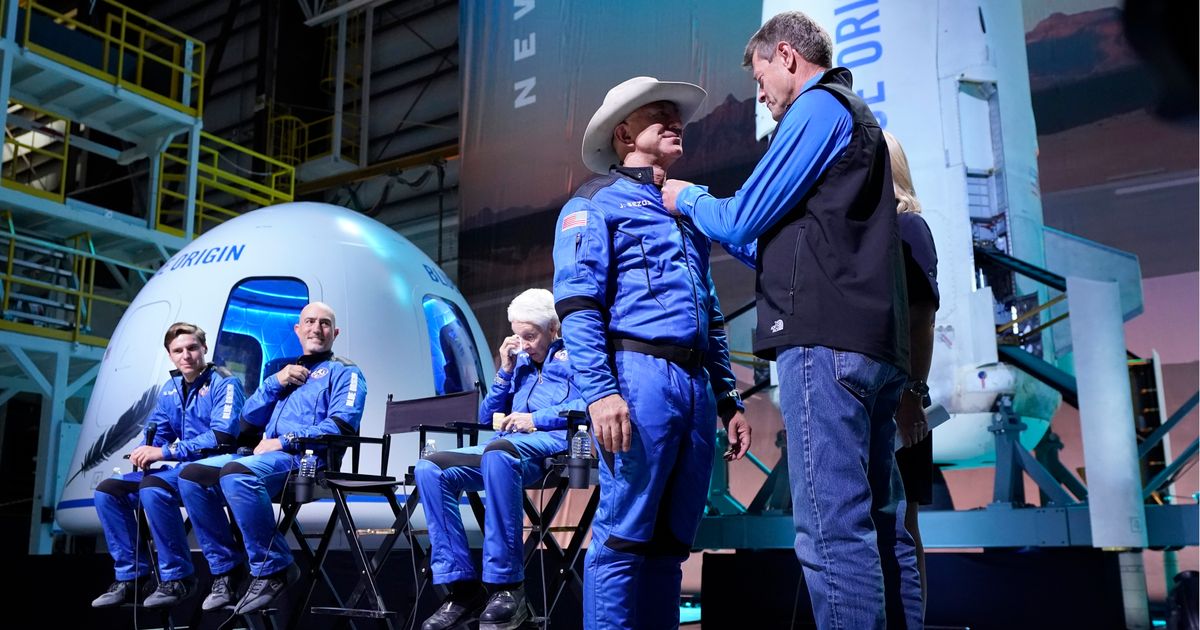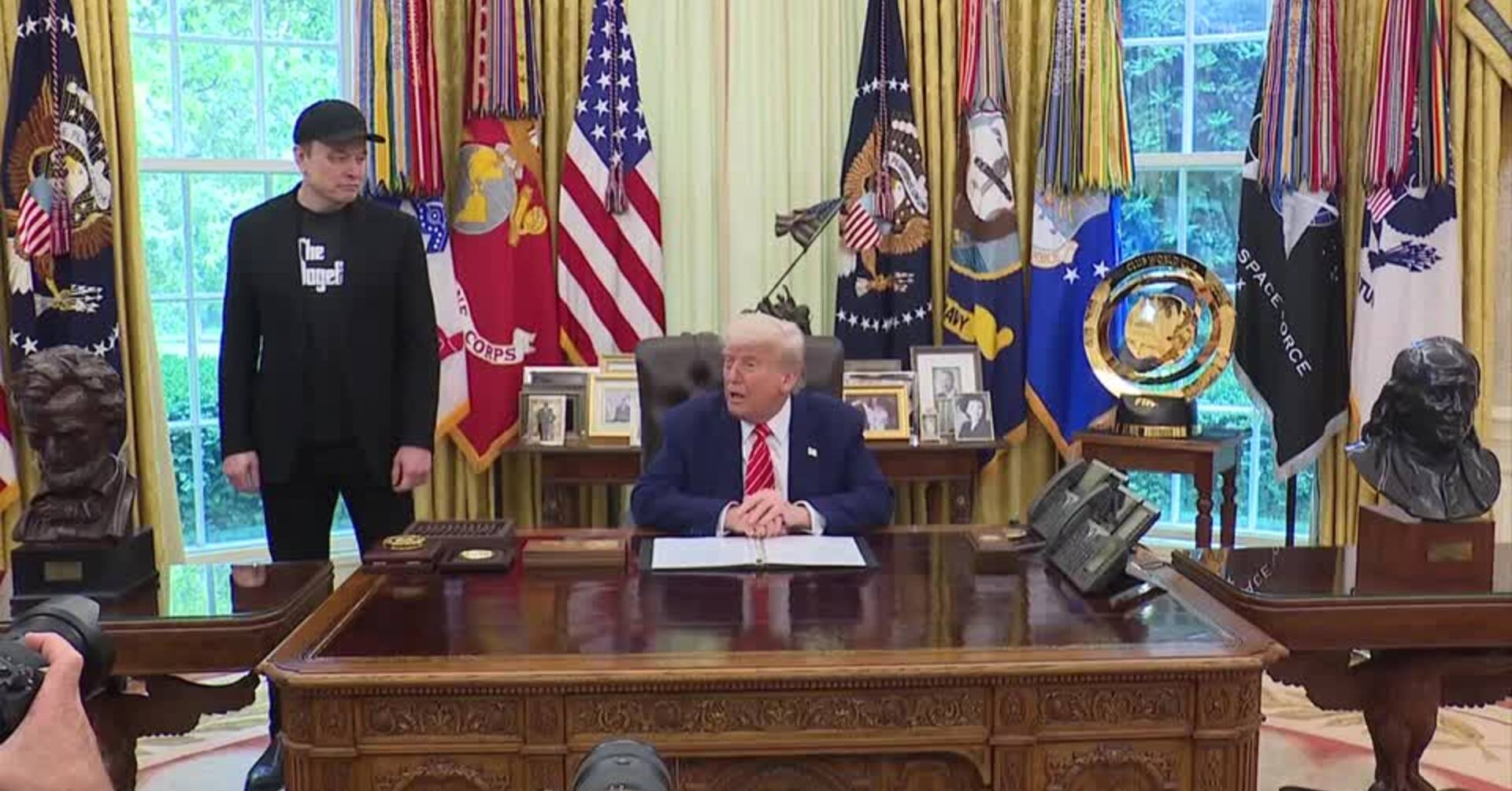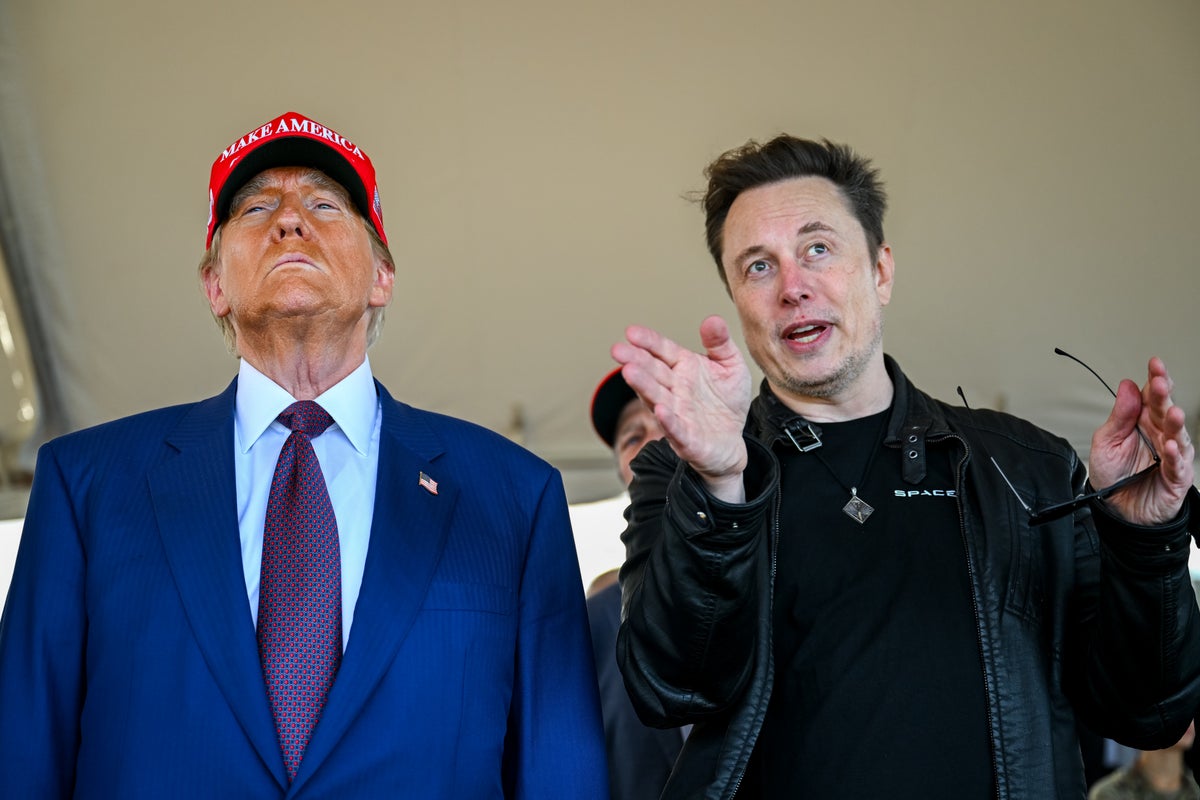Photo: Tony Gutierrez/AP Photo
When Jeff Bezos published an op-ed on Monday defending his decision to kill the Washington Post’s endorsement of Kamala Harris, he included near the bottom of his 911-word article something of a preemptive attack against any suggestion he was motivated by money. Bezos, of course, is one of the world’s richest men. Much of his wealth depends the U.S. government, whether through contracts with federal agencies — like the internet services provided through Amazon Web Services — or merely being allowed to grow Amazon as large as it had. (In fact, it was only last year that the government sued it on antitrust grounds.)
The day the endorsement was pulled, though, an executive of one of Bezos’s companies, Blue Origin CEO David Limp, met with Donald Trump in Austin, Texas. “I sighed when I found out, because I knew it would provide ammunition to those who would like to frame this as anything other than a principled decision,” Bezos wrote. “But the fact is, I didn’t know about the meeting beforehand. Even Limp didn’t know about it in advance; the meeting was scheduled quickly that morning. There is no connection between it and our decision on presidential endorsements, and any suggestion otherwise is false.”
The Washington Post, which Bezos bought for $250 million 11 years ago, has borne the brunt of Bezos’s decision — the paper announced it has already lost 250,000, or 10 percent, of subscribers — but the implications may be far larger for his multibillion-dollar private-rocket company. Blue Origin is one of the many also-rans of the 21st-century space race, running far behind Elon Musk’s SpaceX. But unlike other rocket companies, Bezos’s is probably the most likely to seriously challenge Musk’s dominance during the next decade, thanks to his own $200 billion or so personal fortune as well as billions of dollars in government contracts. The path to Blue Origin getting bigger — including launching ever-more ambitious missions into space — depends not just on contracts with NASA and the Department of Defense but on federal approval of corporate mergers and acquisitions. Hanging over Bezos’s comments is the Federal Trade Commission, an agency that is currently suing Amazon for being a monopoly.
Bezos founded Blue Origin in 2000, but he has reportedly been deeply focused on the company since 2021. That was the year he stepped down as Amazon’s CEO and started flying rich, space-loving thrill seekers (including himself) just high enough that they could claim to be in space. At the time, he was not the only billionaire breaking free from earth’s surly bonds, as Richard Branson had beat him to sub-orbital heights by nine whole days. From there, though, the space race faded from public view. Branson’s company went public in a disastrous SPAC. Musk’s company appeared so far ahead of the competition that it won a contract to rescue astronauts stuck at the International Space Station — and eventually to drag it out of orbit.
Setting aside the complex astrophysics of launching rockets into orbit, the billionaire space race at some level is also a contest of who can win the most government money. There are only a handful of companies that are capable of meeting the enormously onerous requirements laid out by NASA and the DoD. During the last decade, even before Bezos started dedicating himself to his extraterrestrial ambitions, he was reportedly focused on beating out Musk for the multibillion-dollar contracts to launch payloads and rockets. “Elon’s real superpower is getting government money,” Bezos said in 2016, according to the Washington Post. “From now on, we go after everything that SpaceX bids on.”
Since then, though, SpaceX has become far more important as a government contractor, not only for shooting rockets into space but for its Starlink satellite-internet division, which has been crucial for governments and militaries around the world. Bezos, on the other hand, has found himself as the rare CEO who was out of favor in both the Trump and Biden administrations. In April 2019, the Post reported, then-Vice-President Mike Pence’s chief of staff alerted Blue Origin officials to Bezos’s poor reputation in the White House, telling them that they have a “Washington Post problem.” Trump had also said he wanted to “screw Amazon” out of a $10 billion deal to provide cloud computing to the Pentagon, according to a memoir by his Defense Secretary James Mattis. It’s since come out that Oracle, led by Trump donor and Musk mentor Larry Ellison, had set out to sabotage the deal. Things haven’t gotten any easier for Bezos under Biden, though. The administration has zeroed in on Amazon as well as other tech companies, including Google and Meta, for their market dominance. Lina Khan, the FTC Chair, argued that Bezos’s retailer was an illegal monopoly and should be broken up. (Amazon is currently fighting the FTC.)
Last year, though, it looked like Bezos’s days in the political wilderness might finally be coming to an end. Boeing and Lockheed Martin were looking to unload their own joint-venture rocket company, United Launch Alliance. Boeing has had a terrible year and recently has had to tank its own stock price in order to raise capital. ULA had billions of dollars in government contracts, extensive infrastructure, and an experienced team. Bezos’s company, though, had lots of money and a motivated owner, and Blue Origin was reported to be the favorite to take it over. Even the head of the U.S. Space Force’s purchases seemed to be pushing for the two rocket companies to merge, telling an industry audience that “they need to scale” in order to meet an aggressive launch schedule.
This is where the story of ULA becomes, in one of Bezos’s favored words, a “complexifier.” When Boeing and Lockheed formed the company in 2005, one of its biggest challengers was none other than Musk. SpaceX was a new company at the time, and Boeing and Lockheed effectively controlled this slice of the space industry. When the Federal Trade Commission considered clearing the way for the joint venture, it noted that the Department of Defense was “concerned that Boeing and Lockheed will have an incentive to defend ULA’s monopoly by refusing to consider on equal terms any other launch-service competitors that may emerge, such as SpaceX.” An FTC commissioner “reluctantly” approved to the deal in 2006, based on a complex oversight agreement with the DoD, and conceded that ULA would become a “monopolist.”
If anything, the opposite happened. Because of ongoing problems with its planes, strikes, and aggressive competition, Boeing is now reportedly thinking of selling off its entire space business, in addition to ULA, a choice that would have seemed unthinkable just a decade ago. But while ULA has lost market share to SpaceX, it is still a major force in the space industry, competing for dozens of launches during the next four years, which can bring in billions more revenue. A roll up with Blue Origin would make a lot of sense from a corporate standpoint. (At one point this July, Bezos sold more than $5 billion worth of Amazon stock, which seemed to hint that something big was about to come. After all, he partly funds the company through sales of Amazon shares.) Last year, The Wall Street Journal reported that Blue Origin had even submitted a bid to buy it.
It’s not clear why ULA hasn’t been acquired yet. Blue Origin didn’t return a request for comment. If Bezos wanted to grow Blue Origin, though, he hardly would have been able to rely on Trump to allow a deal to sail through. Bezos said that the decision to kill the op-ed wasn’t motivated by his Blue Origin business, but he doesn’t mention how the meeting between the company’s CEO and Trump came to be, only that “the meeting was scheduled quickly that morning.” (NPR reporter David Folkenflik broke the news about it.) There is still a lot that isn’t clear about why the Post never ran an op-ed. What’s more certain is that, regardless of what was discussed beforehand, it will probably help build Bezos’s business from here on out.


